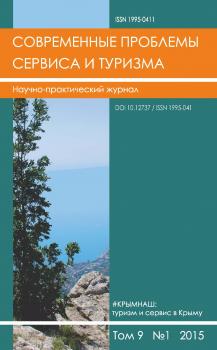Kazan, Russian Federation
In the last few years, the development of adventure tourism as a kind of active tourism initiatives, tourism firms have become more visible. Adventuretourism (adventure tourism) is different in originality and unusual variety of tours. It includes exotic travel, extreme sports, a specific move connected with risk and danger to life. In this regard, the article highlights the criterion of the differences of adventure tourism from other types of active travel. The authors point out the the main reasons for the popularity of adventure tourism of the article, among which are following: healthy lifestyle popularization, prestige of the activity of the pleasure, the desire of the modern tourist for new experiences and the rush of emotion, the possibility of self-realization, improving credibility and promotion in society through adventure tourism, including with help of social networks. Taking into account the growing popularity of adventure tourism in the world, the authors of the article analyzes the factors of Russia’s competitiveness for the adventure tourism development. It is revealed that strengths are rail transport infrastructure and a high level of health and hygiene. The article admits that now the development of adventure tourism in Russia is constrained by a number of negative factors to be overcome. Among them are the lack of a comprehensive look at the geography of Russia from the standpoint of the selection of adventure territories, the unsatisfactory level of tourist infrastructure of adventure, poor range and low quality of ser- vices adventure tourism, weak professional background of the staff.
adventure tourism, active tourism, tourist infrastructure, global competitiveness o*rating, adventure tourism services
1. Babliyan S.A., Alieva F.B. K voprosu o sostoyanii otrasli turizma v Rossiyskoy Federacii // Kurortno-rekreacionnyy kompleks v sisteme regional'nogo razvitiya: innovacionnye pod- hody. 2014. №1 . S. 12-14.
2. Bogatyreva E.V. Priklyuchencheskiy turizm // Turizm i otdyh. 2006. №8. S. 23-25.
3. Buzni A.N., Trenihina A.A. K voprosu ob institucional'noy organizacii aktivnogo turizma // Nauchnyy al'manah. 2016. №1-1(15). S. 48-53. DOI:https://doi.org/10.17117/na.2016.01.01.048.
4. Il'in V.N., Fedosova V.Yu. Problemy i perspektivy razvitiya priklyuchencheskogo turizma v Rossii // Vestnik altayskoy nauki: Zhurnal teoreticheskih i prikladnyh issledovaniy. 2009. №3(6). S. 193-195.
5. Kazakova E.A. Priklyuchencheskiy turizm kak odno iz proyavleniy sovremennyh tendenciy v rekreacii // Aktual'nye problemy fizicheskoy kul'tury, sporta, turizma i rekreacii. Sb. mat. V Vseros. s mezhdunar. uch. nauch.-prakt. konf. stud. i asp. Kazan': PGAFKSiT, 2017. S. 297-299.
6. Lukina E.A. Osnovnye prichiny rosta populyarnosti ekstremal'nogo i priklyuchencheskogo turizma // Sovremennye problemy servisa i turizma. 2009. №1. S. 29-34.
7. Nogina M.A. Priklyuchencheskiy i ekstremal'nyy turizm: soderzhanie ponyatiy i prichiny populyarnosti v molodezhnoy srede // Nauchno-metodicheskiy elektronnyy zhurnal «Koncept». 2015. №3. S. 126-130.
8. Romanova I.V. Priklyuchencheskiy turizm: evolyuciya i sovremennoe znachenie termina v zarubezhnyh issledovaniyah mirovoy turistskoy industrii // Vestnik Voronezhskogo gosudarstvennogo universiteta. Seriya Geografiya i geoekologiya. 2015. №4. S. 46-52.
9. Tillyaeva A.M., Davydova O.V. Priklyuchencheskiy turizm v Rossii: sostoyanie i perspektivy razvitiya // V sb.: Strategiya razvitiya industrii gostepriimstva i turizma: VI Mezhdunar. Internet-konf. Orel: OGU, 2016. S. 288-291.
10. Trenihina A.A. K voprosu ob aktivnom turizme // Vestnik sovremennyh issledovaniy. 2017. №1-2(4). S. 157-171.
11. Trenihina A.A. Suschnostnaya harakteristika ponyatiya i osnovnyh kategoriy aktivnogo turizma // Veles. 2016. №1-3(31). S.51-54.
12. Cvetkov E.I. Problemy i perspektivy terminologii sportivno-priklyuchencheskogo turizma // Industriya turizma: vozmozhnosti, prioritety, problemy i perspektivy. 2015. №8-1. S. 131- 147.
13. Dickson T., Dolnicar S. No risk, no fun: The role of perceived risk in adventure tourism. CD Proceed- ings of the 13th International Research Conference of the Council of Australian University Tourism and Hospitality Education (CAUTHE 2004). Wollongong, 2004.
14. Fynn P. Adventure Tourism: The New Frontier // International Journal of Contemporary Hospitality Management. 2004. Vol.16. Iss.2. Pp. 144-144. DOI:https://doi.org/10.1108/09596110410520043.
15. Schneider P.P., Vogt C.A. Applying the 3M Model of Personality and Motivation to Adventure Travelers// Journal of Travel Research. 2012. Vol.51. Iss. 6. Pp. 704-716. DOI:https://doi.org/10.1177/0047287512451134.
16. Williams P., Soutar G., Ashill N., Naumann E. Value drivers and adventure tourism: A comparative analysis of Japanese and Western consumers // Journal of Service Theory and Practice. 2015. Vol.27. Iss.1. Pp. 102-122. DOI:https://doi.org/10.1108/JSTP-05-2015-0116.





